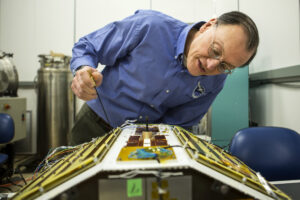Written by: Melissa F. Priebe
A new director will lead the U-M Space Institute, which is the center of space-related research across the University of Michigan.
Professor Chris Ruf, who works in the U-M Department of Climate and Space Sciences and Engineering, was named the director of the U-M Space Institute in July. His appointment follows the inaugural Director Michael Liemohn, who has led the Space Institute since it was founded in 2019.
The U-M Space Institute serves as a focal point of space-related research across the university, where stakeholders are encouraged to collaborate with colleagues from a broad range of backgrounds. Through its mission, the Space Institute works to bring together the university community to:
- Foster collaborative and innovative research across campus.
- Coordinate interaction and organization in education and student activities across campus.
- Promote diversity, equity, and inclusion in space sciences, engineering, policy, law and business.
- Facilitate development and sharing of resources, infrastructure, and technology across all levels of maturation.
- Enable mutually beneficial partnerships beyond the University community.
- Advance engineering and management expertise for programs of scale.
 “I am honored and extremely excited about the opportunity to serve as the next Director of the U-M Space Institute,” said Ruf. “Mike Liemohn did a great job establishing the framework of the institute as its first director, and I hope to build on that foundation with growth in our education, research and outreach activities.”
“I am honored and extremely excited about the opportunity to serve as the next Director of the U-M Space Institute,” said Ruf. “Mike Liemohn did a great job establishing the framework of the institute as its first director, and I hope to build on that foundation with growth in our education, research and outreach activities.”
Ruf is best known for his work as the Principal Investigator of the CYGNSS Mission, a constellation of eight satellites conceptualized and built at the University of Michigan. CYGNSS, or the Cyclone Global Navigation Satellite System, was first used to forecast hurricanes. The NASA Mission has since been expanded to provide more research and products, offering insight into issues ranging from microplastics in the ocean to trends in climate change.
“Having worked on many NASA, ESA and DoD space missions and led one, I hope to use that experience to grow our space-related activities across the College and University,” said Ruf.
With the enormous growth of industries in the space sciences and engineering, the U-M Space Institute will serve an important role in the future of space. The institute focuses on three areas, which include conducting research from space, designing systems to operate in space, and allowing humans to live in space. The institute also advances leadership in space activities—scientifically, technically, socially, and commercially.
Explore the U-M Space Institute

